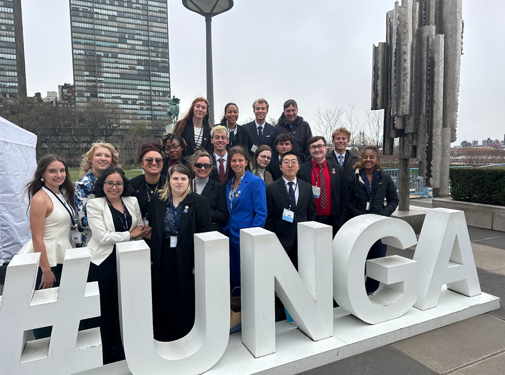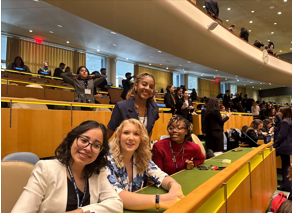Share this Story
Student Delegation Represents Montenegro at National Model United Nations Conference
The 18-member delegation engaged in global diplomacy and debate in New York City
University News | May 8, 2025
 Virginia Wesleyan University’s 18-member delegation recently returned from a successful trip to New York City, where they represented Montenegro at the National Model United Nations (NMUN) conference held in April. The event brought together more than 1,500 students from over 140 institutions across more than 50 countries, fostering collaboration on pressing global challenges.
Virginia Wesleyan University’s 18-member delegation recently returned from a successful trip to New York City, where they represented Montenegro at the National Model United Nations (NMUN) conference held in April. The event brought together more than 1,500 students from over 140 institutions across more than 50 countries, fostering collaboration on pressing global challenges.
VWU’s delegation included Andrew Steiner, Lucas Gordon, Connor Bryant, Frieso ter Schiphorst, Tommi Mero, Jan Puvill Fuertes, Kimberly Carosi, Sarah Reich, Isabelle MacKenzie, Jennifer Mejia, Abigail Carlson, Avery Belisle, Savannah Hein, Jaime Corley, Alessandra Bados, Denise Kamgaing, Bre Bessette, and Mikayla Bryant.
Throughout the semester, the students prepared for the conference as part of a course led by Batten Lecturer of Political Science James Moskowitz. Their preparation involved extensive research on the United Nations system, its agencies, and Montenegro’s foreign policy positions. Topics of focus included preventing the use of chemical weapons by non-state actors, protecting human rights during peaceful protest, and addressing the global impacts of climate change.
A highlight of the conference was a meeting with Dr. Jovan Mirkovic, ambassador of Montenegro to the United States. On the opening day, the ambassador shared insights into Montenegro’s national identity, including its distinction as the world’s first constitutional “ecological state,” committed to environmental and social justice.
“Over five intensive and rewarding days, our students immersed themselves in committee sessions, formal debates, informal caucuses, and working groups,” said Moskowitz. “They represented Montenegro in various UN bodies, including the General Assembly, the UN Economic Commission for Europe (UNECE), the Organization for the Prohibition of Chemical Weapons (OPCW), the Human Rights Council (HRC), the UN High Commissioner for Refugees (UNHCR), and the United Nations Environment Assembly (UNEA).”
He noted that VWU delegates often found themselves negotiating opposite the Russian Federation, remaining in character throughout the debates. They also observed that U.S. delegations frequently withheld support from resolutions that included language related to gender and inclusion.
 Sophomore International Studies major Avery Belisle ’27 reflected on the collaborative nature of the conference:
Sophomore International Studies major Avery Belisle ’27 reflected on the collaborative nature of the conference:
“It wasn’t my first time working with a partner at a conference, but it was the first time my co-delegate was fully engaged. We encouraged each other to perform well, and even when we disagreed, there was mutual respect. Practicing that kind of supportive dynamic was the most valuable part of the experience.”
Junior Connor Bryant ’26 was struck by the diversity of participants:
“I was amazed by how many students came from different countries and cultures. Getting to know them was my favorite part of the trip. Since returning, I’ve been dreaming about traveling and immersing myself in other cultures.”
Students interested in joining next year’s Model UN class are encouraged to speak with their academic advisors.
“You don’t have to be a political science major to be part of the class,” said Denise Kamgaing. “I met many students from other fields who still participated and thrived.”
Interested students should contact Professor James Moskowitz in the Political Science Department for more information.


